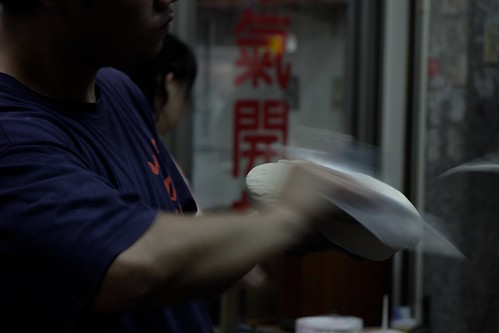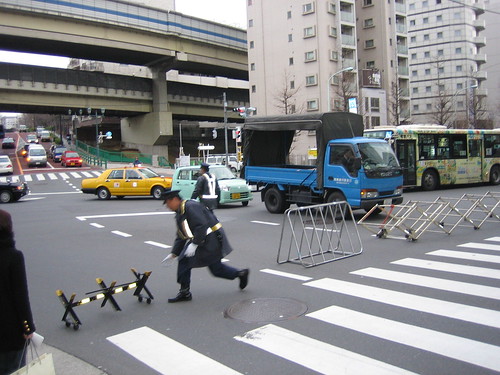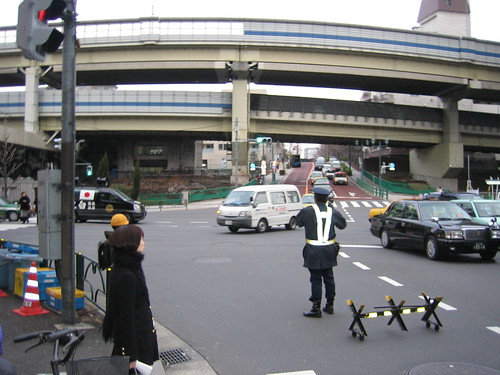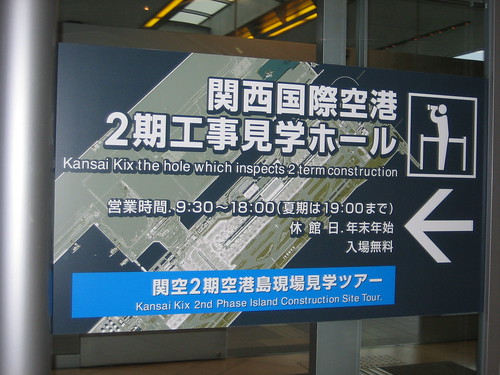Update HERE- finally some good news!
Akihabara News, Engadget, and probably a number of other blogs have posted a completely misinformed and alarmist claim that Japanese law will soon make it illegal to sell used electronics. First the alarmist claim, and then the explanation of why it is about 80-90% incorrect.
The second hand marker flourishes over here, and most people take good care of their equipment, so used goods are usually in a very good condition and are sold easily to be replaced by new goods. It’s easy to strike a good deal when buying these second hand goods. But that’s exactly the big problem for manufacturers, because this grey market is not generating them any profit, and they would like to get rid of this phenomenon.
[…]
So from April 1st 2006, ALL electronic products sold in Japan before 2001 will be prohibited from the 2nd hand market! This means that for example a PC like the Vaio U1 (PCG-U1) will be soon not vailable on the Japanese market anymore, since it was sold in April 2002… and you still have about a month to get a Vaio C1! It also seems that a 5 yeas old product (made after 2001) will Face the same problem in the futur.
Gosh, terrifying isn’t it? Reading it I practically wet my pants and burst into tears simultaneously at the prospect of never again being able to pass up the chance of buying a 20 year old vintage game console. (Note: I just play them on emulators anyway.)
But notice something very important: Engadget is merely repeating what Akihabara News said, and Akihabara News doesn’t quote any source at all. So why don’t we try actually looking at a real news source, and see what they say. As it so happans, the English langauge Asahi website has a very thorough article on this topic.
There are a couple of major points that contradict what the Akihabara News post said.
Well, exports are exempt. Some retailers are hoping to find overseas buyers, or set up branch offices abroad. Leases are exempt, too, meaning retailers can simply lease their products for fixed terms.
[One company] plans to lease its used products, an action not restricted under the law.
The firm will charge customers in advance for a fixed time period, and the customer will be able to return the item at any time. When the lease expires, the firm will simply give the appliance away–another action exempt from the PSE rule.
So foreign sales will not be restricted at all. This is no surprise, considering how common sales of used Japanese vehicles are overseas. For example, in the Philippines all of the buses seem to be bought used from Japan. The very first bus I rode as I stepped out of the airport had a plate mounted above the windshield saying that it had been a Kyoto city bus that was refurbished by the Keihan Bus Company in around 1980. Second, companies can use what seems to amount to fake leases to get around the sales restrictions.
But there is more to it. Domestic non-lease sales are not being flat-out banned anyway, they are simply requiring an inspection. So what is the inspection?
By law, a retailer can become a “manufacturer,” authorized to conduct safety inspections and affix PSE labels, simply by registering with the ministry.
Registered “manufacturers” may attach PSE labels after confirming three very simple things: the product looks fine, works properly when turned on, and does not leak electricity at 1,000 volts.
So any retailer of any size will be able to perform the inspections themselves. This is starting to sound less like ban on second hand sales designed to encourage the consumption of new goods than it is a fairly reasonable attempt at consumer protection.
But there’s something else. Notice the final part of the test, seeing how the device operates at 1000 volts. This law seems not to be aimed at electronics per-se, so much as electrical appliances. I think there’s a strong chance that it doesn’t apply at all to computers (including game systems) due to the nature of the safety tests. Notice they check if it functions safely at 1000 volts, well the electronics of a computer generally run on 12 volts, and any more than that will fry it, so the test clearly can’t apply!
No, instead what they would be testing are devices that include such things as heating coils or motors, that draw large amounts of power and can be a serious fire risk. In the case of a computer or game system, the power supply would certainly require testing, but I think that the primary device will suffer no restrictions whatsoever.
In short, it will be rather more troublesome for retailers to sell used electronics, and there may be less small stores doing so. On the other hand, larger stores with the economy of scale to set up a small certification department will be able to carry on with their business, and used electrical applicances will now come with a certification that they work and don’t catch on fire when you plug them in, which will probably make it easier for consumers to return defective merchandise. I also wouldn’t be surprised to see someone set up a new business, designed simply to test and certify used electronics for the hundreds or thousands of smaller stores that don’t have the ability to do it themselves.
What we will NOT see is the dismal scenario that Akihabara News incorrectly imagined when they first heard about this law.
UPDATE: This site includes very precise details about what the law regulates, in both Japanese and English. It would seem that I was completely correct. Computers are NOT on the list of regulated items, but power cords and transformers/power adapters ARE. In a very interesting turn, it specifies that television recievers are to be regulated, but says nothing about the CRT tube itself (including computer monitors). This is a rather strange turn, since a tv reciever is just another radio reciever-a very low power device, whereas the actual CRT is a very high power device that can deliver a fatal charge or start a fire if tampered with incorrectly.


 I noticed that Kotaku has a
I noticed that Kotaku has a 


 One of the fun things about Japanese law is that it’s really, really difficult to fire people who aren’t on a fixed-term contract. You can’t lay people off for economic reasons in Japan unless there’s simply no way for the company to survive. And you can’t lay people off for poor performance unless they break their rules of employment, which generally requires some sort of intentional wrongdoing or gross negligence.
One of the fun things about Japanese law is that it’s really, really difficult to fire people who aren’t on a fixed-term contract. You can’t lay people off for economic reasons in Japan unless there’s simply no way for the company to survive. And you can’t lay people off for poor performance unless they break their rules of employment, which generally requires some sort of intentional wrongdoing or gross negligence.